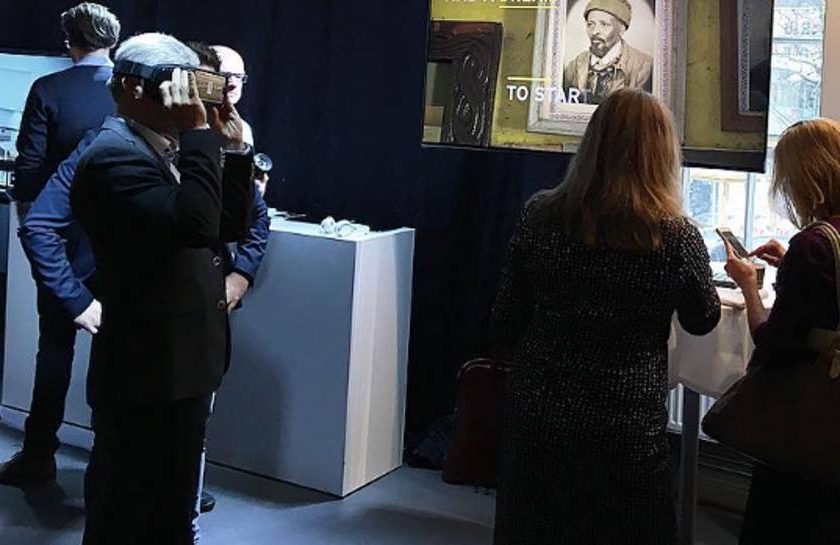Last week we attended Sime Stockholm, a two-day conference about digital opportunities and how to convert these into new business, but also how digitalization can be used to create a better world, to support human rights and to do good.
This combination of altruism and business was very well illustrated by speaker Lars Stugemo, CEO and President, HiQ, who explained how HiQ is focused on making people’s lives simpler and better by building great tech and driving change in every project. With innovations like Swish, HiQ has helped simplify customer’s life by making financial transaction so much easier, and at the same time saving money for the society, as cash handling is very expensive. In Project Ngulia they contribute to stopping the poaching of rhinos in Africa by providing the rangers a simplified communication platform. They have also created a Facebook for deaf blind people by using sensors and smartphone technology. But most of all, Lars Stugemo talked about the emotional dimension when using both your brain and your heart and asked the audience about the last time they were so excited about work that they forgot it was a holiday?
Judging by the inspiring vibe and entrepreneurial buzz from all attendees at the event though, he was not the only one being passionate about his work. “We live in wonderfully abnormal times right now.” Ola Ahlvarsson, Chairman of Sime, said in his opening remarks. “The lean, mean, fail fast and try again world.”
But how do you build your business to meet the exponential changes and disruption caused by digitalisation? As Salim Ismail, former Vice President of Yahoo and Founding Executive Director of Singularity University, pointed out, 20 years ago cell phones were the size of a brief case, now it fits in the palm of your hand. 20 years from now it will be the size of a blood cell. Solar energy was almost condemned not long ago for being too expensive to ever be profitable, but if the current development continues, solar energy will meet 100% of our energy need in 23 years. And collaborative consumption, like AirBnB, will be the largest hotel operator worldwide already next year. What impact will this development have for any organisation? How should organisations respond to a change from scarcity to abundance, or to the key development factors of digitalisation, the internet of things, disruption, demonetizing and democratizing? Soon there will be one trillion connected devices in the world.
Flexibility in the organisation is the key to success in the future, to build organisations for where the development is going, not where it is today. Another is not to kill good ideas before they have been tested. Most experts tend to say no to new revolutionary ideas as they contradict their expertise. Amazon has therefore implemented the ‘Institutional yes’ to avoid killing the next game-changing idea anyone brings up within the organisation.
Anna Felländer, Digital and Futuring Economist, Swedbank, gave an overview of how traditionally the GDP in Sweden has come from manufacturing, which has now been completely changed by the sharing economy. The loss of manufacturing productivity will not be replaced by the intake of digital services, even though the service industry has grown exponentially. There are also risks and society issues these services will lead to, as they do not pay taxes nor create employment to the same extent. But, as Anna Felländer pointed out, things are better than the statistics say. A lot of productivity is actually created, but is not visible in the statistics. For example, time optimization and free digital services are creating real value in the economy.
Somewhat ironically however, digitalisation is spurring physical meetings and urbanisation. All things that can be digitalised will be, but things that cannot be digitalised will instead increase in value. With digitalisation we could work from anywhere, but we value social meetings and creating communities more, thereby building dynamic and creative hubs like the Stockholm start-up community.
Also the following panel with Chris Boos, CEO & Founder Arago, Torbjörn Hägglöf, IBM Watson ambassador, and Claes-Henrik Julander, Founder of Pan Capital, all agreed on the human aspects. In the panel they discussed what will happen when a computer is smarter than all of us, based on their own AI-developed systems. One of the key take-aways was the prediction that specific human skills or aspects will increase in value, like nurses with empathy skills will soon be valued more than doctors, whose skills could easier be replaced by a robot. Another key take-away was the need for responsible decision making and how it is about man and machine together. We have to be the machine’s teachers rather than programming them with ethic rules for the machines to apply on their own. Humans are very good at breaking rules when ethically necessary, something a robot would have problems with.
During the day we also got an inspiring lesson on how to innovate in practice by Mahesh Kumar, Head of corporate Innovation, Result, presentations of some of the coolest new Nordic start-ups and other interesting new products and services (see list below), the results of Schibsted’s Future Report 2016, how virtual reality can be used to create deep understanding, empathy and learning, in the cooperation between UNHCR And Samsung, and a report on the future by Matt Brittin, Head of Europe, Middle East and Africa, Google Inc., where he explained how Google develops their business by asking big ‘What if’-questions about things that can make people’s life better. Matt Brittin also explained how technology development is not evolutionary, but happens via revolutionary breakthroughs. Something that was well illustrated in sessions about new technology advances for exercise and body hacking, showing how robotic arms, appified hearing implants and medical in-body tracking are now a reality.
One of the most interesting, thought-provoking and somewhat disturbing, presentations were made by Dr. Christian Sandström, Associate professor in Technology Management, Chalmers & Ratio, aka “Dr. Death”, who holds a PhD in why companies like Facit, Kodak were disrupted. We will write a separate blog post about his session within short, so stay tuned for more.
As mentioned above, during these two days we experienced a lot of what is going on in the world of Nordic start-ups and many other interesting new products, services and digitalisation projects worldwide. Here is a list of some of these to watch:
- Arago – self-organising technology that uses artificial intelligence for improved decision making
- Calico‘s lifespan increasing project – “death is just an algorithm to hack”
- focus@will – neuroscience based music service to improve concentration
- Fishbrain – a app for logging, sharing and getting useful information for fishing activities
- fiverr – whatever you need done, you can find it on Fiverr for only 5 dollars
- Moodies Emotions Analytics – an app that can decode emotions and underlying attitudes just by listening to a person’s voice (very useful for example for customer support)
- Qualcomm Tricorder XPRIZE $10 million competition for creating a precision diagnostic device, i.e. an artificial intelligence physician that can give better diagnostic than any human physician in the world
- Soylent – a food product developed to solve the problem with the disproportionate amount of time and money spent on creating nutritionally complete meals
- splay networks – a new media platform with networks of next generation top influencers
- Zoundio – AI music engine that models the human perception of music and automates the know-how of an experienced musician, enabling the users to play music like a pro
And not a new one, but one of the best apps really simplifying everyday life: Swish – the app that you can use to transfer money to anyone via your cell phone.

